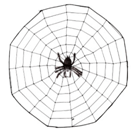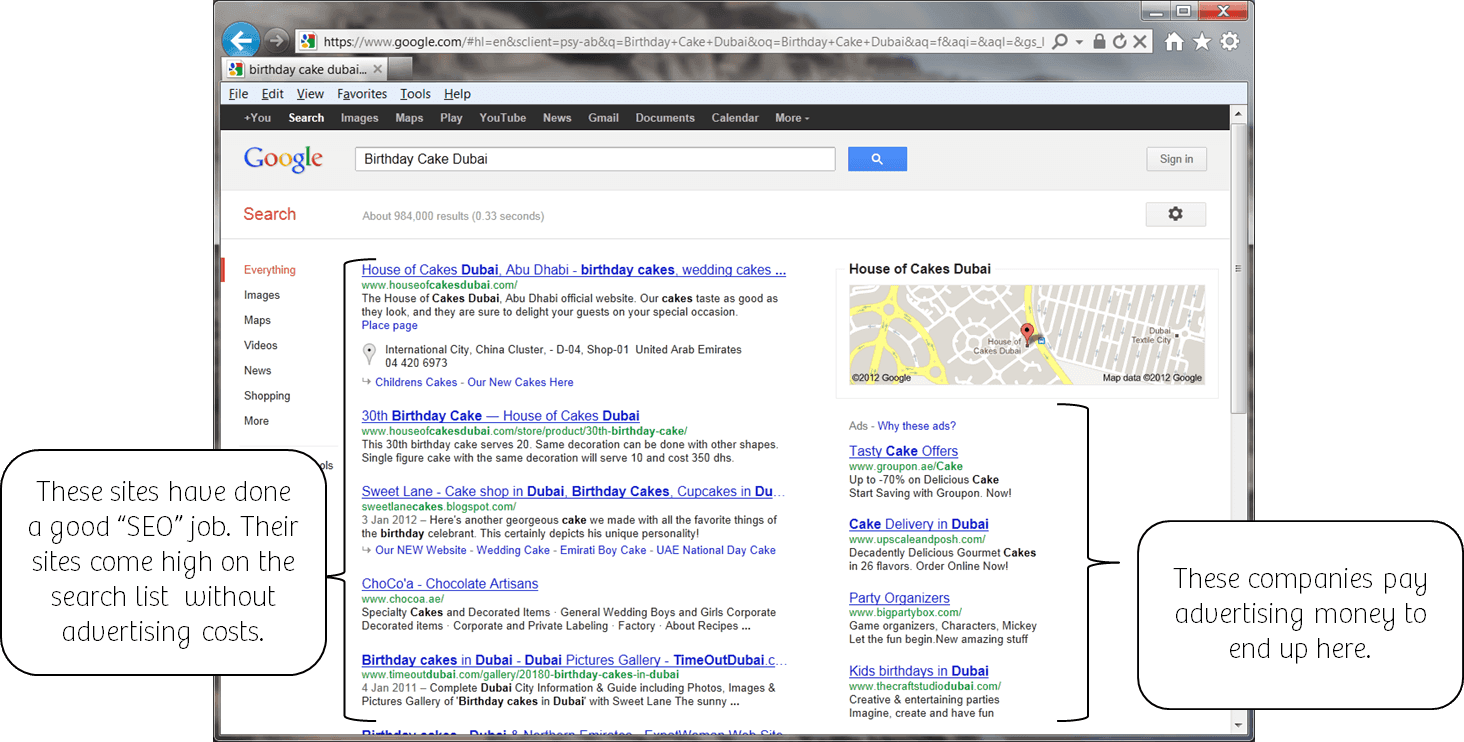What in the world is SEO and why is it important?
One of my ambitions with this blog is to make technology easier to understand for non-technical people. In today’s world, technical terms and abbreviations are part of the daily vocabulary even though many people don’t know what they mean. In this week’s blog article I wanted to give you a quick summary of what SEO is and why it’s important.
What is SEO?
The abbreviation SEO stands for Search Engine Optimization. The term has been used for quite some time. It became popular in 1997-1998 and even though the origin of the term is unclear, many claim that it was introduced by technology blogger Danny Sullivan who was then operating the popular blog site “Search Engine Watch”. The term search engine optimization refers to the technique of getting your web page “high up” on the search result page of search engines such as Google, Bing and Yahoo.
A real-life example of “SEO”
Let me give you an example scenario. Imagine that you have a bakery in Dubai that sells birthday cakes. Someone who wants to purchase a birthday cake goes online and does a search for “birthday cake Dubai” on Google. If your bakery’s web site turns up among the top bakeries on the search result page you have done a good “SEO” job, in other terms optimizing your site for the search term “birthday cake Dubai”. Here are the results of that keyword search using Google:
The search results that appear without any money being paid to the search engine provider are called “organic”. There are also links on the right-hand side of the search result page, these are advertisements. Companies have paid advertising money to appear here.
You shouldn’t be fooled and think that advertised links only appear on the right-hand side of the search screen. If we take another example and search for “birthday cake New York”, you will see that an ad is placed at the top of the search result list.
Advertisements are marked, so you are supposed to be able to tell that it is an advertisement, however, sometimes it can be quite tricky to tell.
Why is SEO important?
Historically businesses have made sure to be listed in different offline directories and phone books so that customers would be able to find them. Today, the Internet is like a huge phone book that lists companies worldwide. If you have a web page and want people to find you by searching for a key term that relates to your business you need to make sure that you end up high in the search results page because most people are lazy and normally don’t go past the first search result page. According to a study done by iProspect back in 2006, 62% of users don’t look past the first page.
How do search engines work?
Search engines all work a bit differently, but in general, you can say that search engines do the following:
 Crawls pages – The search engine goes out on the Internet and “reads” web pages, it does this using a so-called “crawler” or “spider”. The crawler reads the text on the web pages and also follows the links on the pages. The crawler returns to the site regularly to check for any changes.
Crawls pages – The search engine goes out on the Internet and “reads” web pages, it does this using a so-called “crawler” or “spider”. The crawler reads the text on the web pages and also follows the links on the pages. The crawler returns to the site regularly to check for any changes.
- Indexes pages – All the pages that the crawler has visited are stored in the search engine directory – the “index”. The index is a huge database with all the websites that the crawler has visited. In 2008 Google announced that they had hit the milestone of 1 trillion unique website addresses in their index. Search engine indexes are built in a very smart way so that searching and retrieving web pages is super-fast.
- Searches and ranks pages – When someone searches for a keyword, the search engine program looks through all of the billion web pages that are stored in the index and then returns the pages that the search engine deems are the best match for that search. If you have published a web page, but it is not returning in any search results, it might not yet be stored in the search engines index.
How do search engines rank pages?
Now that you know how search engines work, you need to understand how the ranking works. Generally, search engines use proprietary ranking algorithms to determine the quality and relevance of a web page and only the engineers working on these algorithms know the exact details. There are, however, some known and published facts of how search engines rank web pages. Here are a few:
- Relevant content – When the crawler goes through your website it analyzes what words are used most frequently. It also looks at more “important” words, meaning words that are in titles and headings. Words that are at the beginning of pages are seen as more important than words further down on the page. You need to make sure that the content on your site is relevant to the search keywords you want to be associated with.
- Fresh content – Search engines like content that gets updated frequently. The more often you publish a blog, articles, images, videos, etc. the better it is for your web site ranking.
- “Readable” content – Many web pages include videos and images. When we as humans look at a picture we can immediately associate words with the picture. Search engine crawlers aren’t that sophisticated yet, they can’t analyze pictures and it can’t view videos and associate keywords with them. Therefore, you need to help the crawler understand what the image or video is about. You do this by adding so-called “metadata” – data about the content. This could, for example, be descriptive text in the image title. So for instance, instead of naming an image on your website illustrating a chocolate fudge birthday cake “DCS2019.jpg”, you name it “chocolate-fudge-birthday-cake.jpg”.
- Links from other websites – A search engine will rank your website as more relevant if other websites link to your site. But don’t think you can just spread your web page link on thousands of dummy websites and expect better search ranking. The search engines are smarter than that if they notice that you have been “link spamming” your site can be banned, which means it will be removed from the search result list altogether.
- Domain name– If you do a search for “business productivity” on Google today, our site www.businessproductivity.com comes up first. Part of that is because our domain name or our website address contains the words “business productivity”. Search engines factor in your website address name when calculating the relevance of your site for a specific keyword.
Don’t try to master it yourself
There are plenty of SEO consultants who are specialized in helping customers improve their search engine ranking.  Even though I’ve tried to give you a simple overview of SEO, it’s not an easy topic. The search engine providers change the algorithms on average 400 times a year. In order to be good at SEO you need to understand the technology of your website (title tags, alt tags, H1 tags, sitemaps, etc.) you need to have a good strategy for link building, you need to understand new trends in social media and you need to be aware of the SEO tools that are available and know how to use them. SEO is an ever-changing field and there is so much to keep track of.
Even though I’ve tried to give you a simple overview of SEO, it’s not an easy topic. The search engine providers change the algorithms on average 400 times a year. In order to be good at SEO you need to understand the technology of your website (title tags, alt tags, H1 tags, sitemaps, etc.) you need to have a good strategy for link building, you need to understand new trends in social media and you need to be aware of the SEO tools that are available and know how to use them. SEO is an ever-changing field and there is so much to keep track of.
If you are running a business and you want your web page to do well in search engine results I would recommend that you first of all focus on adding great, relevant content to your website, and secondly I would recommend that you learn the basics of SEO so that you can work effectively side by side with an SEO expert, request the right services and understand the results he or she delivers.
(If you have difficulties reading this article, you can access the full article in pdf here)



